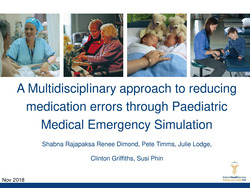Please use this identifier to cite or link to this item:
http://hdl.handle.net/11054/1327| Title: | A multidisciplinary approach to reducing medication errors through paediatric medical emergency simulation. |
| Author: | Dimond, Renee Rajapaksa, Shabna Lodge, Julie Timms, Peter |
| Issue Date: | 2018 |
| Conference Name: | Ballarat Health Services 2018 Annual Research Symposium: research partnerships for population, people and patients; celebrating our research partnerships with the community in the Grampians region |
| Conference Date: | November 29th |
| Conference Place: | Ballarat |
| Abstract: | Background Medical emergencies are often chaotic situations requiring quick decision-making and rapid administration of medicines, which can contribute to errors. The Institute for Safe Medication Practices (ISMP) recommends conducting regular simulation exercises with appropriately trained pharmacists to decrease the risk of medication errors during emergencies. Objectives/Aims To improve the safe use of medicines during paediatric medical emergencies through multidisciplinary team (MDT) observation at regular simulation exercises. Method Monthly in situ medical emergency simulation exercises are held in the Department of Paediatrics at a regional hospital involving paediatric medical and nursing staff, the Medical Emergency Team (MET) and education staff. The paediatric pharmacist is invited to attend as part of the education team. Recommendations from the exercise are considered for system improvement at a departmental and organizational level. The exercise is repeated following implementation of risk reduction strategies to assess improvement. Results The MDT has conducted monthly simulation exercises over a 12-month period which have resulted in the implementation of several risk reduction strategies at a local level, including standardisation of verbal medication ordering processes during emergencies; improved availability of emergence drug resources and paediatric response trolley review including provision of medicines in ready-to-use syringes where possible. The addition of adrenaline auto injectors to the paediatric response trolley has reduced medication selection and preparation errors plus the time to adrenaline administration during repeated anaphylaxis simulation exercises from 10 minutes to less than 1 minute. Similarly time to antibiotic administration in neonatal early onset sepsis, and time to administration of intubation medications have been reduced following implementation of system improvements resulting from repeated simulation exercises. Implications/Outcomes for Planned Research Project Utilising the expertise of the MDT in direct observation allows for identification of human factors that contribute to errors as well as opportunities to improve systems, and is effective in facilitating practice change in readiness for real events. Final Thoughts A multidisciplinary approach to clinical simulation allows for broader analysis of system changes required to enhance medication safety during management of rapidly deteriorating paediatric patients. |
| URI: | http://hdl.handle.net/11054/1327 |
| Internal ID Number: | 01277 |
| Health Subject: | MEDICAL EMERGENCY SIMULATION MEDICAL EMERGENCY TEAM RISK REDUCTION SYSTEM IMPROVEMENT |
| Type: | Conference Presentation |
| Appears in Collections: | Research Output |
Files in This Item:
| File | Description | Size | Format | |
|---|---|---|---|---|
| Shabna RAJAPAKSA.pdf | ppt | 745.93 kB | Adobe PDF |  View/Open |
Items in DSpace are protected by copyright, with all rights reserved, unless otherwise indicated.
